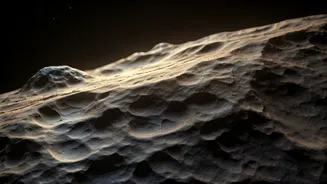Ryugu's Watery Past
The asteroid Ryugu, a celestial body of significant scientific interest, has yielded an extraordinary discovery concerning its history. Scientists have
analyzed samples collected from Ryugu, unveiling evidence of ancient water activity that persisted for an astounding billion years. This revelation offers unprecedented insights into the asteroid's composition and the presence of water, a fundamental ingredient for life, within the early solar system. The meticulous examination of the samples revealed hydrated minerals, providing direct evidence of the past presence of water. This remarkable finding helps scientists piece together the puzzle of how water was distributed in the solar system, potentially influencing the formation of planets and the genesis of life beyond Earth.
Asteroid Sample Analysis
To reach these conclusions, scientists meticulously analyzed the samples brought back from Ryugu. The Hayabusa2 mission, which collected the samples, played a pivotal role in this scientific endeavor. The analysis involved using sophisticated techniques to examine the composition of the materials. Scientists were able to identify the presence of hydrated minerals, minerals containing water molecules within their structure. The findings confirmed that Ryugu's interior was not uniformly dry. This indicates that water was once present, flowing through the asteroid for a considerable period, likely through cracks and fissures within the rocky body. This information is crucial for understanding the evolutionary history of asteroids and how they interacted with their surrounding environment over time.
Solar System Implications
The revelation of ancient water flow on Ryugu has broad implications for understanding the formation and evolution of our solar system. The presence of water on asteroids like Ryugu, billions of years ago, suggests that these celestial bodies could have acted as reservoirs for water. Asteroids could have played a crucial role in delivering water to Earth and other planets during the early stages of the solar system. This could have facilitated the conditions necessary for the emergence of life. Furthermore, studying the water on Ryugu offers scientists insights into the chemical and physical processes that shaped the solar system and how it has changed over time. It can give clues about where else in the cosmos we might find the ingredients for life.
Future Research Avenues
This discovery opens exciting avenues for future research. Scientists are eager to study the Ryugu samples further. Detailed analysis could provide more information about the composition of the water, its origin, and the geological processes that took place within the asteroid. This knowledge can help improve our understanding of asteroid evolution and the potential for these bodies to hold valuable resources. Researchers also hope to use the Ryugu findings to study other asteroids. This will help them find more instances of water and analyze other space bodies with similar characteristics to Ryugu. These future studies will help create a more comprehensive picture of the formation and evolution of the solar system.













